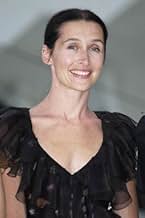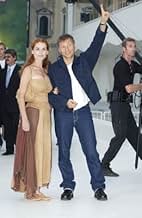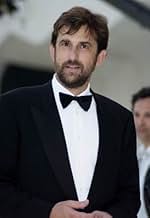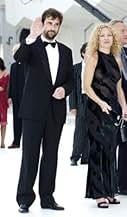NOTE IMDb
6,3/10
2,5 k
MA NOTE
Un cambrioleur new-yorkais, une femme de cent ans coriace, deux frères du Far West, un révolutionnaire macédonien et une belle femme enceinte se croisent dans un conte qui s'étend sur deux c... Tout lireUn cambrioleur new-yorkais, une femme de cent ans coriace, deux frères du Far West, un révolutionnaire macédonien et une belle femme enceinte se croisent dans un conte qui s'étend sur deux continents et trois siècles.Un cambrioleur new-yorkais, une femme de cent ans coriace, deux frères du Far West, un révolutionnaire macédonien et une belle femme enceinte se croisent dans un conte qui s'étend sur deux continents et trois siècles.
- Réalisation
- Scénario
- Casting principal
- Récompenses
- 1 nomination au total
Joseph Mosso
- Church bell
- (as Joe Mosso)
Avis à la une
It's easy to miss what DUST does with the Western's clichés. The movie is a kind of rumination in modern, international terms on THE WILD BUNCH, with some problems (e.g., Joseph Fiennes's Southern accent and arguably too many bloodbaths) and with some remarkable achievements. Chief among these is Manchevski's managing to keep several threads hanging because he pays us the compliment of assuming that we are paying attention, waiting for culmination, like the youngster who finally proves to be the movie's protagonist. We need very few details to make the important connections. The lad is a low-class thief in hock to dirty cops; he confronts an old broad far tougher than he is, who sees his resemblance to the Luke of her memory, a mercenary cowboy who found it easier to kill than love. As she begins a sharp-witted decline to death, she tells Luke's story. The story is full of traps. We think Luke fled to Macedonia because he loves the prostitute his sinister, found-again brother (Fiennes) has married. But Luke and his life are more complicated than that, as we gradually learn, circling through past, present, and the minds of several participants. Manchevski values images, cutting to the old lady's photos from the past, mixing times and spaces within the frame. He insists that we are watching the old lady's story, not even a pretense at reality. At last the youngster takes up the challenge and Luke redeems himself in a final confrontation whose truth is in fiction's need to resolve the central issue: here, that memory is a story which makes time come round to emphasize the dark ironies and pains from which we keep trying to protect ourselves.
After having read some reviews of 'Dust' I was not sure if I wanted to see it or not. However, the "David Wenham infatuation" prevailed in the end, and I went as far as to actually purchase the film. It was money well spent, you could say. While the movie would not appeal to general audiences, it left me awestruck. I ended up watching it again, on the same night.
"Wow" is how I describe feeling after the credits rolled (the first and the second time). I don't want to spoil anything for those who have not seen the movie, so I'll just stick to my reactions to it. There was laughter, there were tears, there might have been an "eww" once or twice, there were definitely lustful thoughts of David Wenham (he's rather cute, you know). Acting was superb, though I'd like a few words with the 'dialect coach' (hint: the leads are not American). All in all, a great movie. I highly recommend seeing it at least once.
"Wow" is how I describe feeling after the credits rolled (the first and the second time). I don't want to spoil anything for those who have not seen the movie, so I'll just stick to my reactions to it. There was laughter, there were tears, there might have been an "eww" once or twice, there were definitely lustful thoughts of David Wenham (he's rather cute, you know). Acting was superb, though I'd like a few words with the 'dialect coach' (hint: the leads are not American). All in all, a great movie. I highly recommend seeing it at least once.
In modern New York, a thief (Adrian Lester) breaks into an old woman's apartment. She surprises him and holds him at gunpoint. She tells him the story about two brothers in the turn of the century. Elijah (Joseph Fiennes) and Luke (David Wenham) have a breakdown in relationship. Luke is drawn to the wild east in Macedonia where the Ottoman is battling a local revolt. He joins a group of bandits pursuing the revolt leader known as The Teacher for the lucrative reward. He gets taken prisoner by the Turks who is joined by his hated brother.
Filmmaker Milcho Manchevski has taken on too much for one movie. It's trying to do too much and ends up stepping on each other. It may work better as an old style violent spaghetti western. Even taken separately, the narrative flow is a bit disjointed. The modern part only adds the trans-generational story. The robbery part isn't that compelling. Without knowing either character, there is nothing to root for or against. It's often problematic to have a character tell the story of the movie. The reliability of the telling is suspect. It's also trying to have some surreal poetry about flying. It's doing too much and gets muddled. This is definitely ambitious and probably too ambitious for its own good.
Filmmaker Milcho Manchevski has taken on too much for one movie. It's trying to do too much and ends up stepping on each other. It may work better as an old style violent spaghetti western. Even taken separately, the narrative flow is a bit disjointed. The modern part only adds the trans-generational story. The robbery part isn't that compelling. Without knowing either character, there is nothing to root for or against. It's often problematic to have a character tell the story of the movie. The reliability of the telling is suspect. It's also trying to have some surreal poetry about flying. It's doing too much and gets muddled. This is definitely ambitious and probably too ambitious for its own good.
If you look past some of the annoying factors (accents, gore, ect...) and let yourself get lured into the storyline of this this movie it is truly amazing. I rented this film thinking it would be just another filler of my time and I was blown away by the complexity of the story and quality of camera work. It was definitely a keeper in my book, I bought it immediately. I hope others will give this one a chance and also become enchanted in the storytelling aspect represented here. It is completely fulfilling to the end.
Milcho Manchevski establishes new guidelines for independent movie makers, successfully balancing between Hollywood commercial and the independent art film. Only few compromises and hybrids like this have proven worth filming (and watching) and I was pleasantly surprised with the outcome.
First of all, there was the careful choice of names - Luke and Elijah (biblical names) opposed to the prostitute Lilith (female demon). No wonder that Lilith was in so many ways connected with water and finally she drowned. Than, there's Neda (from an old Macedonian poem "Serdarot" by Grigor Prlichev, awarded first prize at Athens). Then, a thing which impressed me was the short appearance of certain characters like Sigmund Freud, Pablo Picasso and Josip Broz Tito. Manchevski has used his old "trick" from his first film "Before the Rain" - non-linear time, but while in "Before the rain" the explanation was "The circle is not round, time never dies" in "Dust" it is "The centuries do not follow up each other but coexist like parallel universes".
Repentance was an important motif in the movie, especially the repentance of Luke and Edge.
Certain scenes have moved me, the scene in the hospital when Angela dies and the nurse is asking Edge what is he to her... The scene in Macedonia, when the women are laundering the carpets on a rocky waterfall (Mariovo)... And another thing - me as a Macedonian have always been brought up with the notion that our freedom fighters were noble men who were usually victims of blood thirsty Turks, but this movie had an interesting point that they were all butchers and murderers whose only lust is not freedom or fight against oppression but GOLD!
Probably this movie doesn't have the prophetic touch of "Before the rain" clearly displayed in the current political situation in Macedonia, but there's again the scene with Albanian gangs killing innocent Macedonian cattle breeders.
And another thing - both Angela and Luke are mocking the official clerical (church) "authorities", when Angela refuses the confession of the catholic priest on her death bed and when Luke kills the local orthodox priests offering assistance in the negotiations with the Turks (by the way, the priest is a traitor, which questions another illusion of mine and my generation - that the priests and the Church have been very active in protecting the Macedonian villagers from oppression and torment).
I know one thing for sure - that as soon as I am able I will use my proud privilege to be a Macedonian and visit Mariovo, where a part of the movie was made, and especially the bridge where the Turks attempted to pass so many times during the 17-th century and did not succeed.
The tension seems to fade at some points and that's why the rate of "9" form my user's vote, but still, this is an excellent complete product, made with the touch of perfect craftsmanship.
First of all, there was the careful choice of names - Luke and Elijah (biblical names) opposed to the prostitute Lilith (female demon). No wonder that Lilith was in so many ways connected with water and finally she drowned. Than, there's Neda (from an old Macedonian poem "Serdarot" by Grigor Prlichev, awarded first prize at Athens). Then, a thing which impressed me was the short appearance of certain characters like Sigmund Freud, Pablo Picasso and Josip Broz Tito. Manchevski has used his old "trick" from his first film "Before the Rain" - non-linear time, but while in "Before the rain" the explanation was "The circle is not round, time never dies" in "Dust" it is "The centuries do not follow up each other but coexist like parallel universes".
Repentance was an important motif in the movie, especially the repentance of Luke and Edge.
Certain scenes have moved me, the scene in the hospital when Angela dies and the nurse is asking Edge what is he to her... The scene in Macedonia, when the women are laundering the carpets on a rocky waterfall (Mariovo)... And another thing - me as a Macedonian have always been brought up with the notion that our freedom fighters were noble men who were usually victims of blood thirsty Turks, but this movie had an interesting point that they were all butchers and murderers whose only lust is not freedom or fight against oppression but GOLD!
Probably this movie doesn't have the prophetic touch of "Before the rain" clearly displayed in the current political situation in Macedonia, but there's again the scene with Albanian gangs killing innocent Macedonian cattle breeders.
And another thing - both Angela and Luke are mocking the official clerical (church) "authorities", when Angela refuses the confession of the catholic priest on her death bed and when Luke kills the local orthodox priests offering assistance in the negotiations with the Turks (by the way, the priest is a traitor, which questions another illusion of mine and my generation - that the priests and the Church have been very active in protecting the Macedonian villagers from oppression and torment).
I know one thing for sure - that as soon as I am able I will use my proud privilege to be a Macedonian and visit Mariovo, where a part of the movie was made, and especially the bridge where the Turks attempted to pass so many times during the 17-th century and did not succeed.
The tension seems to fade at some points and that's why the rate of "9" form my user's vote, but still, this is an excellent complete product, made with the touch of perfect craftsmanship.
Le saviez-vous
- AnecdotesDust caused quite a stir when it premiered. A number of European critics viewed Manchevski's film as an extension of his recent op-ed piece in The Guardian. The op-ed asked NATO to take responsibility for a civil war in his homeland Macedonia - even though Dust was finished before the war even began.
- GaffesThe old woman Angela's (Rosemary Murphy) refrigerator dispenses the gold coins from the story, even though they were all scattered at the Turkish camp by Luke (David Wenham) when he came for Neda (Nikolina Kujaca).
Meilleurs choix
Connectez-vous pour évaluer et suivre la liste de favoris afin de recevoir des recommandations personnalisées
- How long is Dust?Alimenté par Alexa
Détails
- Date de sortie
- Pays d’origine
- Site officiel
- Langues
- Aussi connu sous le nom de
- Justice de l'ouest
- Lieux de tournage
- Sociétés de production
- Voir plus de crédits d'entreprise sur IMDbPro
Box-office
- Budget
- 11 000 000 $US (estimé)
- Montant brut mondial
- 108 698 $US
- Durée
- 2h 7min(127 min)
- Couleur
- Mixage
- Rapport de forme
- 1.85 : 1
Contribuer à cette page
Suggérer une modification ou ajouter du contenu manquant































